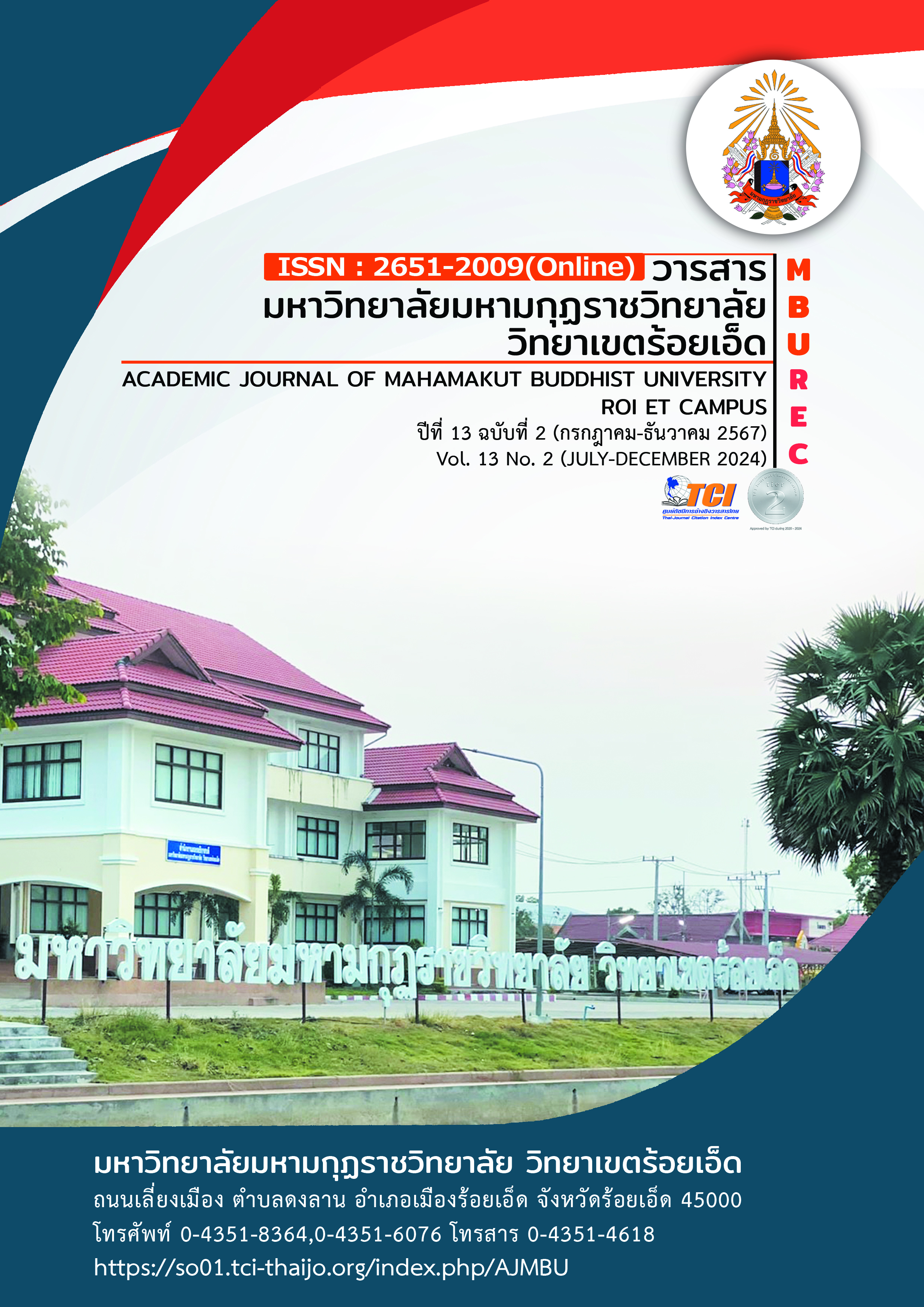THE PROGRAM DEVELOPMENT OF LIFE SKILLS OF PRIMARY SCHOOL STUDENTS UNDER OFFICE OF YASOTHON PRIMARY EDUCATIONAL SERVICE AREA OFFICE 2
Main Article Content
Abstract
The objectives of this research were to; 1) study the components and indicators of life skills of primary school students. 2) study the current situation, desirable conditions, and needs assessment of life skills of primary school students3) create program development of life skills of primary school students and 4) study the outcomes of using the life skills development program among primary school students under office of Yasothon primary educational service area office 2. The research is divided into four phases, with Phase 1: study the components and indicators of life skills of primary school students. The target group of 5 experts, and the research tools include interviews and assessments of the appropriateness and feasibility of the components and indicators. Phase 2 : study the current situation, desirable conditions, and needs assessment of life skills of primary school students. The sample group consists of 263 school administrators and teachers. The research tool used is a questionnaire with a reliability coefficient of 0.79. Phase 3: create program development of life skills of primary school students, the target group of 12 experts for program design and 9 experts for program validation. Research tools include interviews and assessments of the propriety, feasibility, and utility of the development program. Phase 4 : study the outcomes of using the program development of life skills of primary school students. The target group includes 33 primary school students, and research tools consist of assessments of students' life skills development and satisfaction. The statistics used in data analysis include mean, standard deviation and Modified Priority Needs Index (PNIModified).
The results found that: 1. The study revealed that the components and indicators of life skills among primary school students consist of 4 components and 57 indicators. These components and indicators include 1) Analytical thinking, decision-making, and problem-solving with 10 indicators. 2) Establishing positive relationships with others with 14 indicators. 3) Self-awareness and recognizing the worth in oneself and others with 22 indicators. 4) Managing emotions and stress with 11 indicators. The assessment results concluded that the suitability and feasibility of these components and indicators are at the highest level. 2. The current state in overall was high average and the desirable state in overall was in the highest level. The priority need rank from high to low level was 1) self-awareness and others 2) relationships with others 3) emotion and stress management 4) analytical thinking, decision-making, and problem-solving. 3. The development of program life skills of primary school students comprises five components, which are: 1) principles 2) objectives, 3) content 4) development process 5) measurement. The result of evaluation for propriety, feasibility and utility was the highest in overall. 4. The results of using the program development of life skills of primary school students after using the program, the overall difference increased. The assessment results also indicate that satisfaction with the program is at the highest level.
Article Details

This work is licensed under a Creative Commons Attribution-NonCommercial-NoDerivatives 4.0 International License.
References
มัญชลี เปี่ยมดี. (2563). การพัฒนาโปรแกรมการจัดกิจกรรมพัฒนาผู้เรียนของครูเพื่อเสริมสร้างทักษะชีวิตของนักเรียนในโรงเรียนมัธยมศึกษา สังกัดสำนักงานคณะกรรมการการศึกษาขั้นพื้นฐาน. วิทยานิพนธ์การศึกษาดุษฎีบัณฑิต สาขาวิชาการบริหารและพัฒนาการศึกษา. คณะศึกษาศาสตร์ : มหาวิทยาลัยมหาสารคาม.
ยอดอนงค์ จอมหงส์พิพัฒน์. (2553). การพัฒนาโปรแกรมพัฒนาครูผู้นาการจัดการเรียนรู้ตามแนวทางปฏิรูปการศึกษาขั้นพื้นฐาน. วิทยานิพนธ์ปริญญาปรัชญาดุษฎีบัณฑิต สาขาวิชาภาวะผู้นำทางการบริหารการศึกษา. บัณฑิตวิทยาลัย : มหาวิทยาลัยราชภัฏสกลนคร.
รัฐศาสตร์ พาณิชย์พงศภัค. (2559). การพัฒนาโปรแกรมเสริมสร้างสมรรถนะการบริหารหลักสูตร และการจัดการเรียนรู้ของครูโรงเรียนประถมศึกษาเอกชน. วิทยานิพนธ์ปริญญาการศึกษาดุษฎีบัณฑิต สาขาวิชาการบริหารและพัฒนาการศึกษา. คณะศึกษาศาสตร์ : มหาวิทยาลัยมหาสารคาม.
สำนักงานเขตพื้นที่การศึกษาประถมศึกษายโสธร เขต 2. (2564). แผนพัฒนาการศึกษาขั้นพื้นฐาน พ.ศ. 2561-2564. ยโสธร : กลุ่มนโยบายและแผน สำนักงานเขตพื้นที่การศึกษาประถมศึกษายโสธร เขต 2.
สำนักงานคณะกรรมการการศึกษาขั้นพื้นฐาน. (2559). คู่มือบริหารจัดการเวลาเรียน “ลดเวลาเรียน เพิ่มเวลารู้” ปีการศึกษา 2559. กรุงเทพมหานคร : สำนักงานคณะกรรมการการศึกษาขั้นพื้นฐาน.
สำนักงานคณะกรรมการการศึกษาขั้นพื้นฐาน. (2562). การพัฒนาทักษะชีวิตในระบบการศึกษาขั้นพื้นฐาน. กรุงเทพมหานคร : สำนักงานมาตรฐานการศึกษา สำนักงานคณะกรรมการการศึกษาขั้นพื้นฐาน.
สำนักงานคณะกรรมการป้องกันและปราบปรามยาเสพติด. (2561). การป้องกันและแก้ไขปัญหายาเสพติดในสถานศึกษา. กรุงเทพมหานคร : อรุณการพิมพ์.
สุวิมล ว่องวาณิช. (2558). การวิจัยประเมินความต้องการจําเป็น. กรุงเทพมหานคร : สำนักพิมพ์แห่งจุฬาลงกรณ์มหาวิทยาลัย.
Gazda, G. M.; Childers, W. C.; & Brooks, D. K. (1987). Foundations of Counseling and Human Services. New York : McGraw-Hill.
Krejcie, R. V. & Morgan, D. W. (1970). Determining Sample Size for Research Activities. Educational and Psychological Measurement. 30(3). 607–610.
Maxwel, R. (1981). Life After School : A Social Skills Curriculum. New York : Pregamon International Library.


